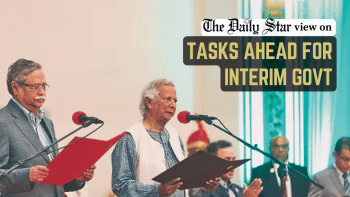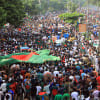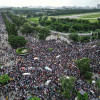Global response to Bangladesh’s transition

We are heartened by the international community's expressed readiness to work with the interim government of Bangladesh, led by its chief, Professor Muhammad Yunus. Following the fall of the Awami League government, due to the popular demand of student protesters and the masses, Bangladesh faces a long journey to chart a democratic future for its people—a challenge recognised by the international community as well. As Bangladesh embarks on this uncertain yet hopeful path, the role of the interim government in steering the nation toward a democratic future cannot be understated.
Bangladesh endured three days without a government, during which law and order deteriorated amid widespread uncertainty. Now that the interim government has been formed, we are confident that stability will return and law and order will improve. As several representatives of our international partners have correctly emphasised, this must be the new government's first priority, along with ensuring accountability for all recent deaths. To achieve this, the interim government may request international assistance, which we hope our partners will be ready to provide upon request.
At this critical stage, with the economy having suffered significantly over the past month—and given the economic challenges that have plagued the country over the last couple of years—Bangladesh will require substantial support from its foreign friends. According to a recent report, the Bangladeshi economy experienced a sharp contraction in July. To get the economy back on track, Bangladesh could benefit from all the help it can get from other countries. To that end, we hope that friendly nations from all regions will step forward.
Given the disruption to business across all sectors in Bangladesh, we urge our international partners to remain patient and work with our industries to ensure that our commercial partnerships can continue to recover and flourish. The European Union, which imports goods worth $24 billion annually from Bangladesh, has expressed its eagerness to engage with the new administration, recognising this moment as crucial for fulfilling the aspirations of the Bangladeshi people, particularly its youth. We believe our other foreign friends share similar views and will engage with the government to achieve positive outcomes for all concerned.
The international response to this transition has been overwhelmingly positive, with key global players pledging their support for Bangladesh's journey toward democracy. The international community's support provides a strong foundation for Bangladesh to rebuild and move forward. However, the ultimate responsibility lies with the Bangladeshi people and their leaders to ensure that this transition marks the beginning of a new, more democratic era in the country's history.

 For all latest news, follow The Daily Star's Google News channel.
For all latest news, follow The Daily Star's Google News channel. 










Comments